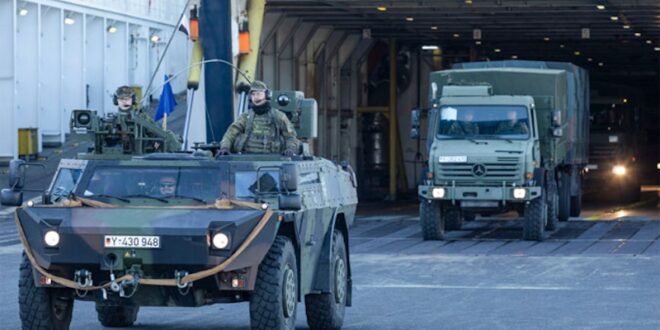Germany will help prop up NATO’s eastern flank further by permanently stationing 4,000 additional soldiers in Lithuania, German Defence Minister Boris Pistorius announced on Monday (26 June), reversing a previous policy.
Berlin leads the so-called Enhanced Forward Presence (eFP) in Lithuania, a mission set up by NATO in 2017 to protect its Eastern border against rising threats from Russia.
Germany pledged reinforcements on NATO’s Eastern flank in Lithuania in response to Russia’s war but has so far refused to confirm whether the contribution would be permanent – until today.
“Germany is prepared to permanently station a robust brigade in Lithuania,” Pistorius told reporters in Vilnius, where he met Lithuanian counterpart Arvydas Anušauskas.
Under Berlin’s understanding of the agreement struck at the Western military alliance’s summit last June in Madrid, the German troops and equipment would be “pre-positioned” on high readiness on German territory and deployed to Lithuania in the event of a crisis.
The hang-up has caused serious tensions between the two countries over the past year, NATO diplomats told EURACTIV.
The German U-turn, increasing the size of the battlegroup by another brigade of 4,000 soldiers, is a momentous step as it would more than double NATO’s presence in the country.
The NATO battlegroup dedicated to Lithuania currently consists of 1,600 troops, 800 of whom are provided by the Bundeswehr, according to a spokesperson of the Bundeswehr’s Joint Operations Command.
The Netherlands, Belgium, Czechia, Norway, Croatia and Luxembourg also contribute on the ground.
“Precondition [for the deployment] is that the necessary infrastructure is in place – barracks, training grounds and depots,” Pistorius said regarding the provision of additional troops.
“This is a strong message and acknowledgement that Eastern Flank needs to be strengthened,” Lithuania’s Foreign Minister Gabrelius Landsbergis told EURACTIV in Vilnius in response to the announcement.
Lithuania has been delaying adopting the budget for such facilities until Berlin had communicated how many troops and which equipment would need accommodating.
However, Vilnius has said it would make sure to create all necessary conditions for creating the infrastructure for hosting the new forces.
Attempted coup in Russia
The timing of Pistorius’ announcement coincides with major developments regarding the war in Ukraine.
On Saturday, the Wagner militia, which played a crucial role in propping up Russia’s invasion of Ukraine, marched on Moscow in what looked like a coup attempt.
Wagner’s leader Yevgeny Prigozhin has now withdrawn his fighters and allegedly retreated to Belarus as part of a deal with Russia’s President Vladimir Putin brokered by Belarus’ President Alexander Lukashenko.
Concerns remain, however, over the impact that political instability in Russia might have on NATO member states at the eastern border.
Unrest in Russia will inevitably have consequences for the security of neighbouring countries, Lithuania’s President Gitanas Nauseda warned on Sunday.
“If Prigozhin or part of the Wagner group ends up in Belarus with unclear plans and unclear intentions, it will only mean that we need to further strengthen the security of our eastern borders,” he added.
A NATO manoeuvre practising the relocation of German troops to Lithuania is underway, which Pistorius was expected to attend later on Monday.
In mid-July, the Lithuanian capital will host NATO’s annual summit, where the military alliance’s heads of state are expected to adopt new defence plans for the Euro-Atlantic area and discuss Ukraine’s path to membership.
 Eurasia Press & News
Eurasia Press & News



